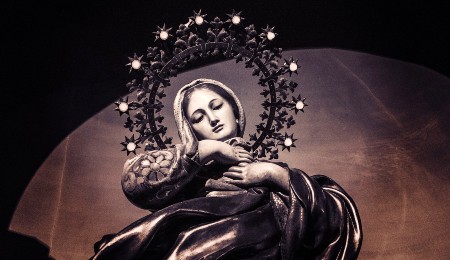We ask you, urgently: don't scroll past this
Dear readers, Catholic Online was de-platformed by Shopify for our pro-life beliefs. They shut down our Catholic Online, Catholic Online School, Prayer Candles, and Catholic Online Learning Resources essential faith tools serving over 1.4 million students and millions of families worldwide. Our founders, now in their 70's, just gave their entire life savings to protect this mission. But fewer than 2% of readers donate. If everyone gave just $5, the cost of a coffee, we could rebuild stronger and keep Catholic education free for all. Stand with us in faith. Thank you.Help Now >
Honoring the Holy Name of Mary: The History and Significance of September 12
FREE Catholic Classes
The Feast of the Holy Name of Mary is a cherished celebration in the Catholic Church, rich in history and spiritual significance. This feast, observed on September 12, has evolved through centuries of devotion and historical events. Here's a closer look at its origins, development, and the reasons behind its placement on the liturgical calendar.

Image by Jose Manuel de Laa from Pixabay
Highlights
9/12/2024 (1 year ago)
Published in Living Faith
Keywords: Holy Name of Mary, Virgin Mary, Mary Feast
The origins of the Feast of the Holy Name of Mary date back to the early 16th century. According to the Catholic Encyclopedia, the feast was first instituted in 1513 in Cuenca, Spain. Initially, it was assigned to September 15, which is the octave day of the Nativity of the Virgin Mary. This connection reflects a deep association between the feast of Mary's birth and the reverence for her holy name.
In 1587, after the Breviary reform by St. Pius V, the feast was moved to September 17 by a decree of Sixtus V. This change emphasized the feast's close link to the feast of the Holy Name of Jesus, which is celebrated eight days after the birth of Christ, aligning with the Jewish custom of circumcision and naming.
A Feast of Victory and Devotion
The significance of September 12 as the date for the Feast of the Holy Name of Mary took on a new dimension after the siege of Vienna in 1683. The victory of King John III Sobieski over the Ottoman Turks on this date was seen as a miraculous intervention attributed to the Virgin Mary's intercession. Pope Innocent XI extended the feast to the universal Church and designated it to be celebrated on the Sunday following the Nativity of Mary. This decision underscored the belief that Mary played a pivotal role in the victory and was a testament to her powerful intercessory role.
In 1908, a decree stipulated that if the feast could not be observed on its proper Sunday due to a higher-ranking feast, it should be celebrated on September 12. This date was chosen to honor the victory of Sobieski and reflect Mary's significant role in this historic triumph.
Theological and Liturgical Significance
The Feast of the Holy Name of Mary is not only a celebration of historical events but also of profound theological importance. The feast underscores Mary's role in salvation history and her intercessory power. It invites the faithful to honor the name of Mary, reflecting on her purity, grace, and maternal care.
The close connection between the feast of the Holy Name of Mary and the Nativity of Mary is particularly noteworthy. Just as the feast of the Holy Name of Jesus is celebrated eight days after the birth of Christ, so too is the Feast of the Holy Name of Mary celebrated within the octave of her Nativity. This alignment emphasizes the continuity of Marian devotion and the reverence for her holy name within the broader context of Christian liturgical practice.
The Feast of the Holy Name of Mary, celebrated on September 12, is a testament to the enduring significance of Marian devotion in the Catholic Church. From its origins in 16th-century Spain to its universal recognition following the Siege of Vienna, this feast highlights the deep-rooted tradition of honoring Mary's holy name and her role in the history of salvation. As we commemorate this feast, we are reminded of Mary's profound influence and her role as a powerful intercessor for the faithful.
--------------------------------------------------------------------------------------------------------------------------------------------
Your support makes stories like this possible!
Catholic Online is completely donor supported, allowing us to report on what truly is happening in the world, free of charge and uncensored. A donation to Catholic Online will ensure millions around the world can continue to come to our site to find the faith people are so desperately searching for in life.
Join the Movement
When you sign up below, you don't just join an email list - you're joining an entire movement for Free world class Catholic education.
An Urgent Message from Sister Sara – Please Watch
- Easter / Lent
- 5 Lenten Prayers
- Ash Wednesday
- 7 Morning Prayers
- Mysteries of the Rosary
- Litany of the Bl. Virgin Mary
- Popular Saints
- Popular Prayers
- Female Saints
- Saint Feast Days by Month
- Stations of the Cross
- St. Francis of Assisi
- St. Michael the Archangel
- The Apostles' Creed
- Unfailing Prayer to St. Anthony
- Pray the Rosary
![]()
Copyright 2026 Catholic Online. All materials contained on this site, whether written, audible or visual are the exclusive property of Catholic Online and are protected under U.S. and International copyright laws, © Copyright 2026 Catholic Online. Any unauthorized use, without prior written consent of Catholic Online is strictly forbidden and prohibited.
Catholic Online is a Project of Your Catholic Voice Foundation, a Not-for-Profit Corporation. Your Catholic Voice Foundation has been granted a recognition of tax exemption under Section 501(c)(3) of the Internal Revenue Code. Federal Tax Identification Number: 81-0596847. Your gift is tax-deductible as allowed by law.







